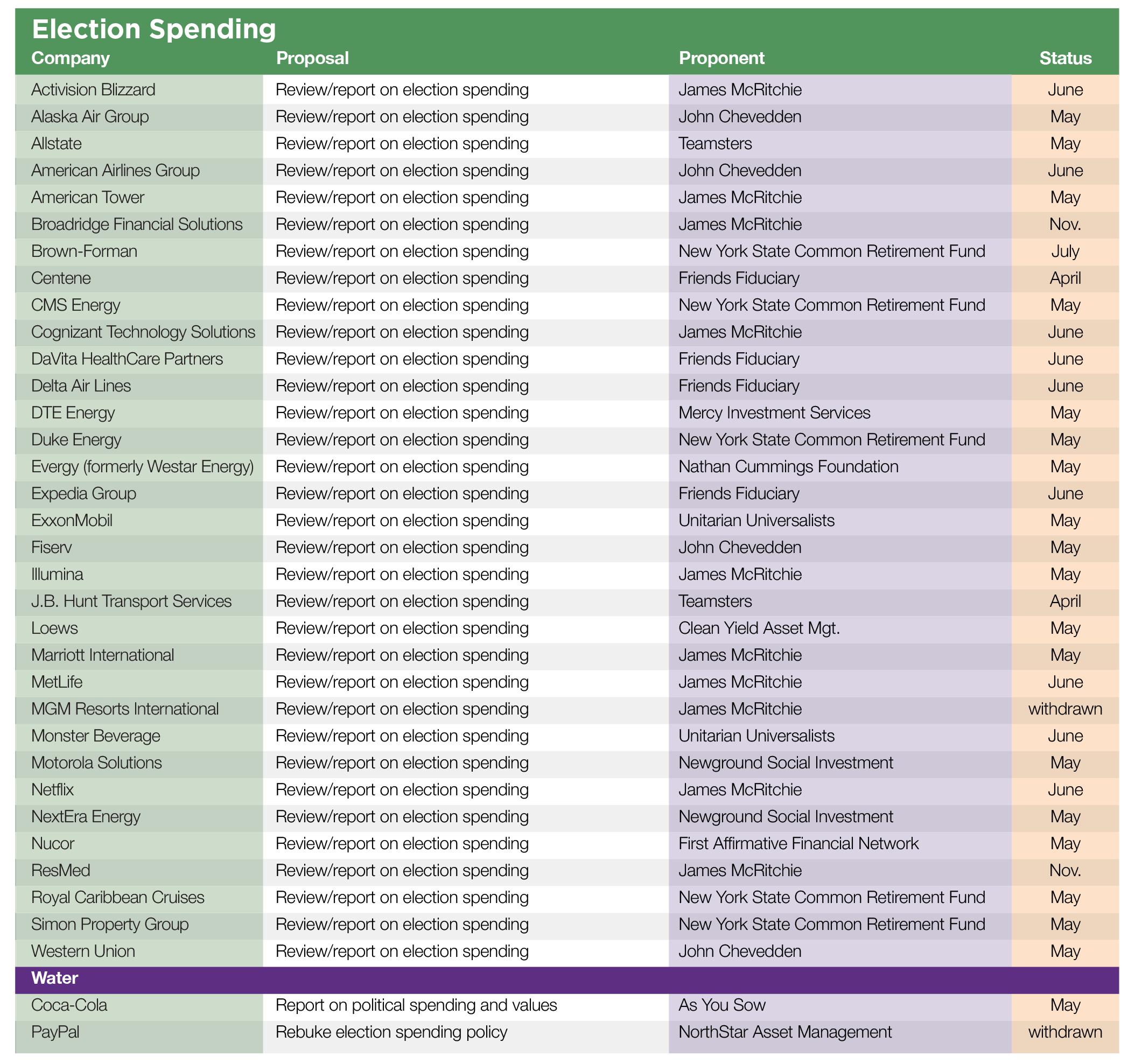The Center for Political Accountability and its allies, a wide variety of institutional investors, continue to seek board oversight and transparency about election spending from corporate treasuries, with 34 proposals filed this year. Nearly two-thirds (20) are resubmissions, 14 of which were first proposed last year. (See table for the full list.) Support from investors for these resolutions has continued to climb and averaged 36.2 percent last year, a big jump from earlier. Votes in 2019 included two majorities at Cognizant Technology Solutions (53.6 percent) and Macy’s (53.1 percent) and nine more tallies over 40 percent.
2020: YEAR OF RECKONING FOR COMPANIES ON POLITICAL SPENDING
BRUCE FREED
President, Center for Political Accountability
DAN CARROLL
Vice President for Programs, Center for Political Accountability
As the 2020 proxy season unfolds, this is the moment to assess the real impact of corporate political spending, the heightened risk companies and our society face, and what more needs to be done to address it.
The amount and consequences of company spending shouldn’t be underestimated. The common misperception is that individuals and private companies are the dominant donors. The Center for Political Accountability (CPA) undertook the first look into the sources of money for and the impact of spending by six partisan “527” committees that have reshaped state and national politics over the past decade. They included the Republican and Democratic governors’ associations, state legislative campaign committees, and attorneys general associations. Here’s what we found:
The standard CPA proposal, which has not been changed for several years, asks companies to produce a report, with semiannual updates, on:
Policies and procedures for making, with corporate funds or assets, contributions and expenditures (direct and indirect) to (a) participate or intervene in any political campaign on behalf of (or in opposition to) any candidate for public office, or (b) influence the general public, or any segment thereof, with respect to an election or referendum.
Monetary and non-monetary contributions and expenditures (direct and indirect) used in the manner described in section 1 above, including:
a. The identity of the recipient as well as the amount paid to each; and
b. The title(s) of the person(s) in the Company responsible for decision-making.
Withdrawal: James McRitchie withdrew at MGM Resorts International after the company agreed to adopt the CPA model policy and disclosure. More withdrawals are likely as the season progresses. Last year, proponents reached agreements and withdrew proposals at 13 companies.
SEC action: NextEra Energy is contending that the resolution, in its sixth year, is moot given recent reforms undertaken after the 2019 vote. The proposal has earned increasing levels of support, starting with 39.5 percent in 2015 and reaching 48.7 percent in 2019.
Rebuke: NorthStar Asset Management filed a resolution at PayPal that the company challenged, arguing that it was not a proper shareholder request and also was too vague. It was a new request and criticized the company’s PAC spending. NorthStar withdrew before any SEC response. The resolution said:
Resolved: Shareholders rebuke the Board of Directors at PayPal Holdings, Inc. for failing to have in place adequate measures to ensure that political contributions made by the Company or its PAC are in line with PayPal’s stated values and goals.
One more proposal also addresses congruency between corporate values and political spending, at Coca-Cola. It expresses concern about the company’s efforts to oppose bill requiring bottle deposits to encourage recycling and support for candidates that oppose reproductive health rights. The proposal is a new iteration of earlier calls for values congruency in corporate political spending, aired at other companies and asks that the company publish an annual report on “the congruency of political and electioneering expenditures during the preceding year against publicly stated company values and policies.” (See p. 47 for more on a new campaign from Rhia Ventures on reproductive health rights.)




